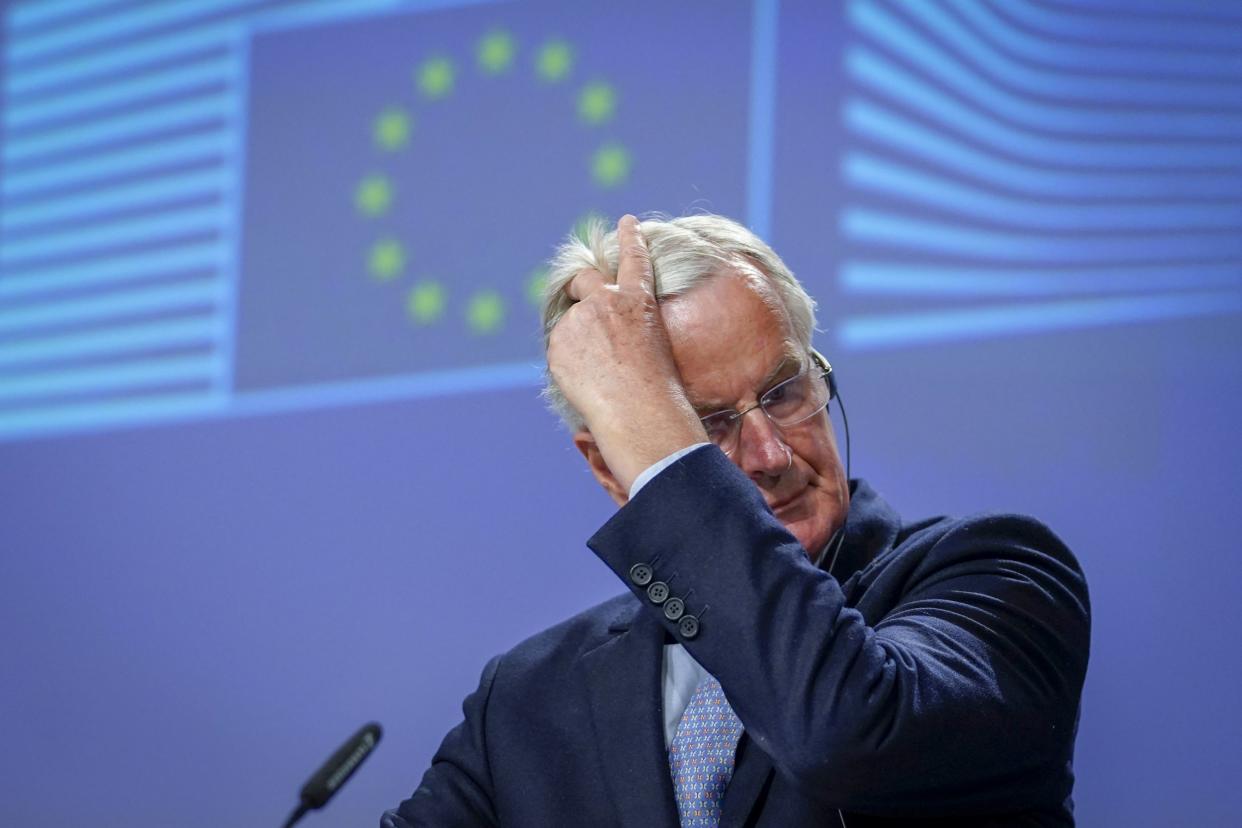Fears of no-deal in Brexit trade talks rise as another round of negotiations ends in acrimony

Fears of a no-deal in Brexit trade talks have heightened as another round finished without progress and Brussels accused the UK of backtracking on its promises.
Business groups and unions on the British side of the channel warned negotiators to "buckle down" and said a disorderly Brexit could mean we “potentially face a bigger challenge to the food supply chain” than coronavirus.
EU chief negotiator Michel Barnier said on Friday that talks could not "go on like this forever" while his UK counterpart David Frost admitted that progress required both sides "intensify and accelerate our work".
Speaking at a press conference at the close of negotiations, Mr Barnier listed four specific points in the Brexit “political declaration” on the future relationship signed by Boris Johnson in January that he said were not being adhered to.
“It will remain for us the only valid reference, the only relevant precedent in this negotiation. That was agreed by both sides. Yet, round after round, our British counterparts seek to distance themselves from this common basis," he said of the agreement.
But Mr Frost appeared to downplay the significance of the document signed by Mr Johnson, telling journalists afterwards that something being mentioned in the document "doesn't mean that everything in the declaration must go into a legally binding treaty".
He added: "It establishes the scope of our discussions on the future relationship."
Turning to the wider issues blocking a deal such as fishing and regulatory standard, Mr Barnier said: “There has been no significant progress on these points, as I’ve said, not since the start of these negotiations and I don’t think we can go on like this forever."
Back in Westminster Andrew Opie, director of food sustainability at the British Retail Consortium, told MPs that Britain could be able to go "out of the frying pan into the fire" by bouncing from the coronavirus crisis to Brexit disruption at borders.
“If we thought [disruption during coronavirus] was a problem, I think we should starting looking forward to a disorderly Brexit in January,” he told the Environment, Food and Rural Affairs Committee.
“If we get a disorderly Brexit we potentially face a bigger challenge to the food supply chain than was faced with Covid.”
He noted that in January "90 per cent of our lettuces and 80 per cent of our tomatoes and 70 per cent of our soft fruit" come across the channel that that disruption could empty shelves.
Other groups echoed the same warnings. Josh Hardie, deputy director-General of the Confederation of British Industry (CBI), warned that many businesses were simply not ready for the no-deal being threatened.
“Progress is worryingly slow, causing deep concern to firms when resilience has rarely been more fragile
Josh Hardie, CBI
“Progress is worryingly slow, causing deep concern to firms when resilience has rarely been more fragile," he said.
“The stark reality is that most businesses are understandably unprepared for a dramatic change in trading relations with our biggest partner in just six months’ time. With jobs in every region of the UK and EU under pressure, the stakes are higher than ever.
“A deal that works for both sides economies is the only way forward. Political leaders should step in urgently, change the dynamic and find solutions that protect people’s livelihoods. Failure to break the deadlock only leaves a choice between an extension that the UK Government has already ruled out or worse, a deeply damaging no deal.”
Mark Bridgeman, president of the Country Land and Business Association, which represents some farmers and rural businesses said the "limited progress" was hugely concerning.
"Make no mistake, without a quality free trade agreement thousands of farmers both in the UK and the EU would go out of business, with all the devastation to lives and communities that go with it," he said.
“We understand a degree of posturing is inevitable, but no one – on either side of the negotiating table – should forget what is at risk. We strongly encourage both sides to return to the table as quickly as possible.”
Frances O’Grady, general secretary of the Trades Union Congress (TUC) said: “The prime minister must buckle down and get a good deal for workers’ jobs and rights.
“The coronavirus crisis has already put hundreds of thousands of jobs at risk. The government can’t allow a no-deal Brexit to put even more families’ livelihoods on the line.
“Ministers must negotiate a deal with the EU that preserves our access to European markets, supporting good jobs and protecting us from dodgy trade deals with the likes of Donald Trump.”
There is one more round of talks scheduled this month before a planned high-level "stock take" between Boris Johnson and European Commission Ursula von der Leyen, where both sides will consider the progress made so far.
Mr Barnier said he hoped that the next round of talks could be conducted face-to-face as opposed to via videoconference, which he said would be “better and more effective”.
The meeting will be the last chance for the European Commission to convince the UK of the merits of any extension, which the British government has rejected. The deadline for agreeing an extension beyond the end of this year, buying more time for talks, is the end of June.
Read more
Sadiq Khan breaks Labour ranks to call for Brexit transition extension
Four ways the Brexit transition period could still be extended
EU Brexit trade demands won't change to suit UK, Brussels says
Brexit negotiator says he doesn’t answer to Dominic Cummings


